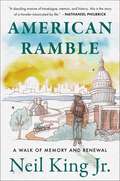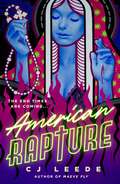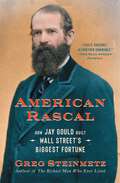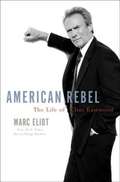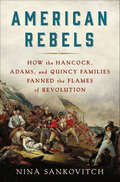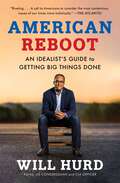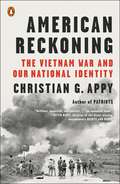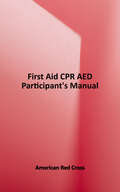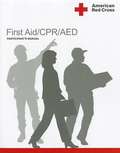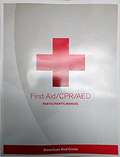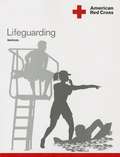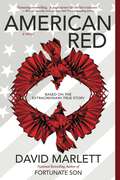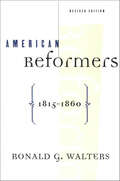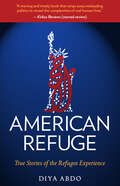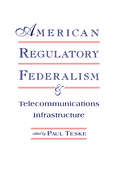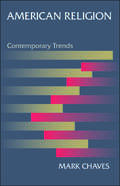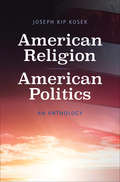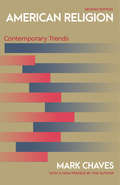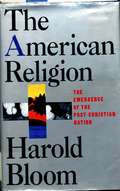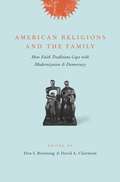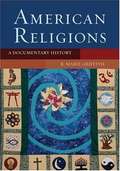- Table View
- List View
American Ramble: A Walk of Memory and Renewal
by Neil King“American Ramble is a dazzling mixture of travelogue, memoir, and history. At times profound, funny, and heartbreaking, this is the story of a traveler intoxicated by life. I couldn’t put it down.” — Nathaniel PhilbrickA stunning, revelatory memoir about a 330-mile walk from Washington, D.C., to New York City—an unforgettable pilgrimage to the heart of America across some of our oldest common ground. Neil King Jr.’s desire to walk from Washington, D.C., to New York City began as a whim and soon became an obsession. By the spring of 2021, events had intervened that gave his desire greater urgency. His neighborhood still reeled from the January 6th insurrection. Covid lockdowns and a rancorous election had deepened America’s divides. Neil himself bore the imprints of a long battle with cancer.Determined to rediscover what matters in life and to see our national story with new eyes, Neil turned north with a small satchel on his back and one mission in mind: To pay close attention to the land he crossed and the people he met.What followed is an extraordinary 26-day journey through historic battlefields and cemeteries, over the Mason-Dixon line, past Quaker and Amish farms, along Valley Forge stream beds, atop a New Jersey trash mound, across New York Harbor, and finally, to his ultimate destination: the Ramble, where a tangle of pathways converges in Central Park. The journey travels deep into America’s past and present, uncovering forgotten pockets and overlooked people. At a time of mounting disunity, the trip reveals the profound power of our shared ground.By turns amusing, inspiring, and sublime, American Ramble offers an exquisite account of personal and national renewal—an indelible study of our country as we’ve never seen it before.
American Rapture
by CJ LeedeThe instant USA Today bestseller from CJ Leede, author of Maeve Fly—a scorching and sweeping new novel about the end of the world as we know it.“A blistering, feverish ride through a uniquely American apocalypse."—Chuck Wendig, New York Times bestselling authorNamed one of the Best Horror Books of 2024 (Esquire, Vulture, Paste, ScreenRant, and Literary Hub) • A GoodReads and Publishers Weekly Editors' Pick • An Indie Next Pick • A Splatterpunk Award Finalist!A virus is spreading across America, transforming the infected and making them feral with lust. Sophie, a good Catholic girl, must traverse the hellscape of the midwest to try to find her family while the world around her burns. Along the way she discovers there are far worse fates than dying a virgin… The end times are coming.Also by CJ Leede:Maeve FlyAt the Publisher's request, this title is being sold without Digital Rights Management Software (DRM) applied.
American Rascal: How Jay Gould Built Wall Street's Biggest Fortune
by Greg SteinmetzA gripping, &“rollicking&” (John Carreyrou, New York Times bestselling author of Bad Blood) biography of Jay Gould, the greatest of the 19th-century robber barons, whose brilliance, greed, and bare-knuckled tactics made him richer than Rockefeller and led Wall Street to institute its first financial reforms.Had Jay Gould put his name on a university or concert hall, he would undoubtedly have been a household name today. The son of a poor farmer whose early life was marked by tragedy, Gould saw money as the means to give his family a better life…even if, to do so, he had to pull a fast one on everyone else. After entering Wall Street at the age of twenty-four, he quickly became notorious when he paralyzed the economy and nearly toppled President Ulysses S. Grant in the Black Friday market collapse of 1869 in an attempt to corner the market on gold—an event that remains among the darkest days in Wall Street history. Through clever financial maneuvers, he gained control over one of every six miles of the country&’s rapidly expanding network for railroad tracks—coming close to creating the first truly transcontinental railroad and making himself one of the richest men in America. American Rascal shows Gould&’s complex, quirky character. He was at once praised for his brilliance by Rockefeller and Vanderbilt and condemned for forever destroying American business values by Mark Twain. He lived a colorful life, trading jokes with Thomas Edison, figuring Thomas Nast&’s best sketches, paying Boss Tweed&’s bail, and commuting to work in a 200-foot yacht. Gould thrived in an expanding, industrial economy in which authorities tolerated inside trading and stock price manipulation because they believed regulation would stifle the progress. But by taking these practices to new levels, Gould showed how unbridled capitalism was, in fact, dangerous for the American economy. This &“gripping biography&” (Fortune) explores how Gould&’s audacious exploitation of economic freedom triggered the first public demands for financial reforms—a call that still resonates today.
American Realism and Naturalism
by Donald PizerDonald Pizer presents the major critical discussions of American realism and naturalism from the beginnings of the movement in the 1870s to the present. He includes the most often cited discussions ranging from William Dean Howells, Henry James, and Frank Norris in the late nineteenth century to those by V. L. Parrington, Malcolm Cowley, and Lionel Trilling in the early twentieth century. To provide the full context for the effort to interpret the nature and significance of realism and naturalism during the periods when the movements were live issues on the critical scene, however, he also includes many uncollected essays. His selections since World War II reflect the major recent tendencies in academic criticism of the movements. Through introductions to each of the three sections, Pizer provides background, delineating the underlying issues motivating attempts to attack, defend, or describe American realism and naturalism. In particular, Pizer attempts to reveal the close ties between criticism of the two movements and significant cultural concerns of the period in which the criticism appeared. Before each selection, Pizer provides a brief biographical note and establishes the cultural milieu in which the essay was originally published. He closes his anthology with a bibliography of twentieth-century academic criticism of American realism and naturalism.
American Rebel: The Life of Clint Eastwood
by Marc EliotAs an actor, he seduces us with his tough-guy charm. As a director and producer, he amazes us with his artistry and technical savvy. As a Hollywood icon, Clint Eastwood, one of film's greatest living legends, represents some of the finest cinematic achievements in the history of American cinema. In American Rebel, bestselling author and acclaimed film historian Marc Eliot examines the ever-exciting, often-tumultuous arc of Clint Eastwood's life and career. Unlike past biographers, Eliot writes with unflinching candor about Eastwood's highs and lows, his artistic successes and failures, and the fascinating, complex relationship between his life and his craft. Eliot's prodigious research reveals how a college dropout and unambitious playboy rose to fame as Hollywood' s "sexy rebel," eventually and against all odds becoming a star in the Academy pantheon as a multiple Oscar winner. Spanning decades, American Rebel covers the best of Eastwood' s oeuvre, films that have fast become American classics–Fistful of Dollars, Dirty Harry, Unforgiven, Mystic River, Million Dollar Baby, and Gran Torino. Filled with remarkable insights into Eastwood's personal life and public work, American Rebel is highly entertaining and the most complete biography of one of Hollywood's truly respected and beloved stars–an actor who, despite being the Man with No Name, has left his indelible mark on the world of motion pictures.From the Hardcover edition.
American Rebels: How the Hancock, Adams, and Quincy Families Fanned the Flames of Revolution
by Nina SankovitchNina Sankovitch’s American Rebels explores, for the first time, the intertwined lives of the Hancock, Quincy, and Adams families, and the role each person played in sparking the American Revolution.Before they were central figures in American history, John Hancock, John Adams, Josiah Quincy Junior, Abigail Smith Adams, and Dorothy Quincy Hancock had forged intimate connections during their childhood in Braintree, Massachusetts. Raised as loyal British subjects who quickly saw the need to rebel, their collaborations against the Crown and Parliament were formed years before the revolution and became stronger during the period of rising taxes and increasing British troop presence in Boston. Together, the families witnessed the horrors of the Boston Massacre, the Battles of Lexington and Concord, and Bunker Hill; the trials and tribulations of the Siege of Boston; meetings of the Continental Congress; transatlantic missions for peace and their abysmal failures; and the final steps that led to the signing of the Declaration of Independence.American Rebels explores how the desire for independence cut across class lines, binding people together as well as dividing them—rebels versus loyalists—as they pursued commonly-held goals of opportunity, liberty, and stability. Nina Sankovitch's new book is a fresh history of our revolution that makes readers look more closely at Massachusetts and the small town of Braintree when they think about the story of America’s early years.
American Reboot: An Idealist's Guide to Getting Big Things Done
by Will HurdFrom former Republican Congressman and CIA Officer Will Hurd, a bold political playbook for America rooted in the timeless ideals of bipartisanship, inclusivity, and democratic values.It&’s getting harder to get big things done in America. The gears of our democracy have been mucked up by political nonsense. To meet the era-defining challenges of the 21st century, our country needs a reboot. In American Reboot, Hurd, called &“the future of the GOP&” by Politico, provides a clear-eyed path forward for America grounded by what Hurd calls pragmatic idealism—a concept forged from enduring American values to achieve what is actually achievable. Hurd takes on five seismic problems facing a country in crisis: the Republican Party&’s failure to present a principled vision for the future; the lack of honest leadership in Washington, DC; income inequality that threatens the livelihood of millions of Americans; US economic and military dominance that is no longer guaranteed; and how technological change in the next thirty years will make the advancements of the last thirty years look trivial. Hurd has seen these challenges up close. A child of interracial parents in South Texas, Hurd survived the back alleys of dangerous places as a CIA officer. He carried that experience into three terms in Congress, where he was, for a time, the House&’s only Black Republican, representing a 71 percent Latino swing district in Texas that runs along 820 miles of US-Mexico border. As a cyber security executive and innovation crusader, Hurd has worked with entrepreneurs on the cutting edge of technology to anticipate the shockwaves of the future. Hurd draws on his remarkable experience to present an inspiring guide for America. He outlines how the Republican party can look like America by appealing to the middle, not the edges. He maps out how leaders should inspire rather than fearmonger. He forges a domestic policy based on the idea that prosperity should be a product of empowering people, not the government. He articulates a foreign policy where our enemies fear us and our friends love us. And lastly, he charts a forceful path forward for America&’s technological future. We all know we can do better. It&’s time to hit &“ctrl alt del&” and start the American Reboot.
American Reckoning
by Christian G. Appy"Few people understand the centrality of the Vietnam War to our situation as much as Christian Appy."--Ken BurnsThe critically acclaimed author of Patriots offers profound insights into Vietnam's place in America's self-image. How did the Vietnam War change the way we think of ourselves as a people and a nation? Christian G. Appy, author of the widely praised oral history of the Vietnam War Patriots, now examines the relationship between the war's realities and myths and its impact on our national identity, conscience, pride, shame, popular culture, and postwar foreign policy.Drawing on a vast variety of sources from movies, songs, and novels to official documents, media coverage, and contemporary commentary, Appy offers an original interpretation of the war and its far-reaching consequences. Authoritative, insightful, sometimes surprising, and controversial, American Reckoning is a fascinating mix of political and cultural reporting that offers a completely fresh account of the meaning of the Vietnam War.
American Reckoning: Inside Trump's Trial—and My Own
by Jonathan AlterA vivid eyewitness account of the historic first criminal trial of a president and a cri de coeur for democracy from a New York Times bestselling author and presidential historian.As one of a handful of journalists allowed in the courtroom, for 23 days Jonathan Alter sat just feet away from the most dangerous threat to democracy in American history, watching the spectacle of the century: the felony trial of Donald Trump. Highly publicized but untelevised and thus largely hidden from public view, this landmark trial offered hope of real justice amid a grueling eight-year national ordeal and foreshadowed the drama of the 2024 presidential election. Alter shares everything he witnessed—from eviscerating takes on the colorful characters to the chilling legal ups and downs—to offer a barbed account of the trial and its aftermath, including fresh reporting about the historic events of the summer of 2024. A Zelig of journalism experiencing a crisis of faith in the good sense of the American people, Alter chronicles the shaping of his political consciousness and his bracing, unpredictable relationships with Jimmy and Rosalynn Carter, Bill and Hillary Clinton, Barack Obama, John McCain, and Joe Biden, whose decision to stand down in favor of former prosecutor Kamala Harris put the criminal trial front and center as Americans rendered their own verdict at the polls. Deeply personal and passionate, American Reckoning is an eye-opening book from a journalist with a front row seat on history, offering a troubled yet hopeful look at our national moment of truth.
American Red Cross First Aid, CPR, AED Program Participant's Booklet
by American Red CrossFirst aid training booklet.
American Red Cross First Aid/ CPR/ AED Participant's Manual
by American Red CrossThe American Red Cross First Aid/CPR/AED Participant’s Manual supports the courses in the American Red Cross First Aid/CPR/AED program, to teach participants the knowledge and skills needed to give immediate care to an injured or ill person and to decide whether advanced medical care is needed. This manual contains information about recognizing an emergency, the emergency action steps, recognizing cardiac arrest, signs of a heart attack, giving CPR, the cardiac chain of survival, how to use an AED, care for choking, and care for sudden illnesses and other life-threatening injuries. As well as the information and skills needed to assist with an asthma inhaler, epinephrine auto-injector, splinting, tourniquet application, and naloxone administration. This program offers a choice of first aid, CPR and AED courses to meet the various training needs of a diverse audience. The care steps in the program are consistent with the 2020 International Liaison Committee on Resuscitation (ILCOR) Consensus on Science and Treatment Recommendations for CPR and Emergency Cardiovascular Care (ECC) and the 2020 American Heart Association and American Red Cross Guidelines for CPR and First Aid.
American Red Cross First Aid/CPR/AED Participant's Manual
by The American National Red CrossThis is the fourth edition of the American Red Cross First Aid/CPR/AED Participant's Manual. This is a revised version of the text that was previously published under the title, First Aid/CPR/AED for Schools and the Community. This manual reflects the 2010 Consensus on Science for CPR and Emergency Cardiovascular Care (ECC) and the Guidelines 2010 for First Aid.
American Red Cross First Aid/CPR/AED: Participant’s Manual
by American Red CrossThis participant's manual is part of the American Red Cross First Aid/ CPR/AED program. This manual contains three parts: 1. First Aid Basics; 2. First Aid for Cardiac Emergencies and Choking; and 3. First Aid for Common Illnesses and Injuries.
American Red Cross Lifeguarding Manual
by American Red CrossDesigned to simplify learning, the participants manual reinforces key points from the course. The manual can also be used as a reference for working lifeguards after the course.
American Red Cross Swimming and Water Safety
by American Red CrossPeople are drawn to water. Look at any waterfront and you will likely see boardwalks, beaches, bike paths, marinas and plenty of people enjoying themselves. Couples and students on spring break seek tropical beaches as vacation spots while families flock to waterparks and lake cabins. Commercial fishermen and mariners take to the water for their livelihoods. Water is an important part of our lives.
American Red: A Novel
by David MarlettThe Great American Century begins, the modern world roars to life, Capitalists flaunt greed and seize power, Socialists and labor unions flex their violent will, and an extraordinary true story of love and sacrifice unfolds.The men and women of American R ed are among the most fascinating in American history. When, at the dawn of the 20th century, the Idaho governor is assassinated,blame falls on &“Big Bill&” Haywood, the all-powerful, one-eyed boss of the Western Fed- eration of Miners in Denver. Close by, his polio-crippled wife, Neva, struggles with her wavering faith, her love for another man, and her sister's affair with her husband.New technologies accelerate American life, but justice lags behind. Private detectives, bat- tling socialists and unions on behalf of wealthy capitalists, will do whatever it takes to seeHaywood hanged. The scene is set for bloodshed, from Denver to Boise to San Francisco.America's most famous attorney, Clarence Darrow, leads the defense—a philandering U.S. senator leads the prosecution—while the press, gunhands, and spies pour in.Among them are two idealists, Jack Garrett and Carla Capone—he a spy for the prosecu- tion, she for the defense. Risking all, they discover truths about their employers, about themselves and each other, and what they'll sacrifice for justice and honor—and for love.
American Reformers, 1815–1860
by Ronald G. WaltersFor this new edition of American Reformers 1815-1860, Ronald G. Walters has amplified and updated his exploration of the fervent and diverse outburst of reform energy that shaped American history in the early years of the Republic. Capturing in style and substance the vigorous and often flamboyant men and women who crusaded for such causes as abolition, temperance, women's suffrage, and improved health care, Walters presents a brilliant analysis of how the reformers' radical belief that individuals could fix what ailed America both reflected major transformations in antebellum society and significantly affected American culture as a whole.
American Refuge: True Stories of the Refugee Experience (Truth to Power)
by Diya Abdo&“A moving and timely book that strips away misleading politics to reveal the complexities of real human lives." — Kirkus Reviews (starred review)A provocative, conversation-sparking exploration of refugee experiences told in their own words, for readers of Karla Cornejo Villavicencio&’s The Undocumented Americans and Viet Thanh NguyenForced to leave their homes, they came to America...In this intimate and eye-opening book, Diya Abdo--daughter of refugees, U.S. immigrant, English professor, and activist—shares the stories of seven refugees. Coming from around the world, they&’re welcomed by Every Campus A Refuge (ECAR), an organization Diya founded to leverage existing resources at colleges to provide temporary shelter to refugee families.Bookended by Diya&’s powerful essay "Radical Hospitality" and the inspiring coda &“Names and Numbers,&” each chapter weaves the individual stories into a powerful journey along a common theme: Life Before (&“The Body Leaves its Soul Behind&”) The Moment of Rupture (&“Proof and Persecution&”) The Journey (&“Right Next Door&”) Arrival/Resettlement (&“Back to the Margins&”) A Few Years Later (&“From Camp to Campus&”) The lives explored in American Refuge include the artist who, before he created the illustration on the cover of this book, narrowly escaped two assassination attempts in Iraq and now works at Tyson cutting chicken.We learn that these refugees from Burma, Burundi, Iraq, Palestine, Syria, and Uganda lived in homes they loved, left against their will, moved to countries without access or rights, and were among the 1% of the "lucky" few to resettle after a long wait, almost certain never to return to the homes they never wanted to leave. We learn that anybody, at any time, can become a refugee.
American Regulatory Federalism and Telecommunications Infrastructure (LEA Telecommunications Series)
by Paul TeskeDuring this era of construction of the information superhighway, this volume presents a prudent analysis of the pros and cons of continuing state regulation of telecommunications. While interested parties either attack or defend state regulation, careful scholarly analysis is required to strike the appropriate balance of regulatory federalism. Focusing on regulation in the 1990s, it uses a positive political economy perspective to analyze enduring state-federal conflicts and to weigh the justifications and explanations for continuing state telecommunications regulation, or for changing its structure. It also considers normative concerns and makes recommendations about how to improve telecommunications policy. Seriously concerned with assessing the problems surrounding cost burdens for different categories of consumers, market entry for different firms, economic growth and the information infrastructure, global competitiveness, and control over information, this volume attempts to provide answers to the following specific questions: * How are states regulating telecommunications in the brave new world of global markets, fiber optics, and digital technology? * Do states vary significantly in their regulatory models? * How are the politics of state and federal regulation different? * Would a different federal-state relationship better serve national telecommunications goals in the future? To tackle these critical questions, the scholarly perspectives of economists, lawyers, political scientists, and telecommunications consultants and practitioners are employed.
American Religion
by Mark ChavesMost Americans say they believe in God, and more than a third say they attend religious services every week. Yet studies show that people do not really go to church as often as they claim, and it is not always clear what they mean when they tell pollsters they believe in God or pray. American Religion presents the best and most up-to-date information about religious trends in the United States, in a succinct and accessible manner. This sourcebook provides essential information about key developments in American religion since 1972, and is the first major resource of its kind to appear in more than two decades. Mark Chaves looks at trends in diversity, belief, involvement, congregational life, leadership, liberal Protestant decline, and polarization. He draws on two important surveys: the General Social Survey, an ongoing survey of Americans' changing attitudes and behaviors, begun in 1972; and the National Congregations Study, a survey of American religious congregations across the religious spectrum. Chaves finds that American religious life has seen much continuity in recent decades, but also much change. He challenges the popular notion that religion is witnessing a resurgence in the United States--in fact, traditional belief and practice is either stable or declining. Chaves examines why the decline in liberal Protestant denominations has been accompanied by the spread of liberal Protestant attitudes about religious and social tolerance, how confidence in religious institutions has declined more than confidence in secular institutions, and a host of other crucial trends.
American Religion, American Politics: An Anthology
by Jon Butler Joseph Kip KosekEssential primary sources reveal the central tensions between American politics and religion throughout the nation’s history Despite the centrality of separation of church and state in American government, religion has played an important role in the nation’s politics from colonial times through the present day. This essential anthology provides a fascinating history of religion in American politics and public life through a wide range of primary documents. It explores contentious debates over freedom, tolerance, and justice, in matters ranging from slavery to the nineteenth-century controversy over Mormon polygamy to the recent discussions concerning same-sex marriage and terrorism. Bringing together a diverse range of voices from Protestant, Catholic, Jewish, Muslim, and secular traditions and the words of historic personages, from Thomas Jefferson, Abraham Lincoln, and Frances Willard to John F. Kennedy and Martin Luther King, Jr., this collection is an invaluable introduction to one of the most important conversations in America’s history.
American Religion: Contemporary Trends
by Mark ChavesMost Americans say they believe in God, and more than a third say they attend religious services every week. Yet studies show that people do not really go to church as often as they claim, and it is not always clear what they mean when they tell pollsters they believe in God or pray. American Religion presents the best and most up-to-date information about religious trends in the United States, in a succinct and accessible manner. This sourcebook provides essential information about key developments in American religion since 1972, and is the first major resource of its kind to appear in more than two decades. Mark Chaves looks at trends in diversity, belief, involvement, congregational life, leadership, liberal Protestant decline, and polarization. He draws on two important surveys: the General Social Survey, an ongoing survey of Americans' changing attitudes and behaviors, begun in 1972; and the National Congregations Study, a survey of American religious congregations across the religious spectrum. Chaves finds that American religious life has seen much continuity in recent decades, but also much change. He challenges the popular notion that religion is witnessing a resurgence in the United States--in fact, traditional belief and practice is either stable or declining. Chaves examines why the decline in liberal Protestant denominations has been accompanied by the spread of liberal Protestant attitudes about religious and social tolerance, how confidence in religious institutions has declined more than confidence in secular institutions, and a host of other crucial trends. Now with updated data and a new preface by the author, this revised edition provides essential information about key developments in American religion since 1972, plainly showing that religiosity is declining in America.
American Religion: The Emergence of the Postchristian Nation
by Harold BloomHow America has developed unique religious groups.
American Religions and the Family: How Faith Traditions Cope with Modernization and Democracy
by David A. Clairmont Don S. Browning Eds.Religions respond to capitalism, democracy, industrialization, feminism, individualism, and the phenomenon of globalization in a variety of ways. Some religions conform to these challenges, if not capitulate to them; some critique or resist them, and some work to transform the modern societies they inhabit. <P><P>In this unique collection of critical essays, scholars of Judaism, Christianity, Islam, Hinduism, Buddhism, Confucianism, and Native American thought explore the tension between modernization and the family, sexuality, and marriage traditions of major religions in America. Contributors examine how various belief systems have confronted changing attitudes regarding the meaning and purpose of sex, the definition of marriage, the responsibility of fathers, and the status of children. They also discuss how family law in America is beginning to acknowledge certain religious traditions and how comparative religious ethics can explain and evaluate diverse family customs.Studies concerning the impact of religious thought and behavior on American society have never been more timely or important. Recent global events cannot be fully understood without comprehending how belief systems function and the many ways they can be employed to the benefit and detriment of societies. Responding to this critical need, American Religions and the Family presents a comprehensive portrait of religious cultures in America and offers secular society a pathway for appreciating religious tradition.
American Religions: A Documentary History
by R. Marie GriffithReligion has played a complex, vibrant, and multifaceted role in our nation's history. One of the most effective ways to help students explore its vitality is through primary sources. American Religions: A Documentary History is the only one-volume, up-to-date collection of primary sources available for American religious history courses. Featuring a creative dual structure--the readings are arranged both chronologically and thematically--this indispensable sourcebook can be used in both historically and topically organized courses. Balancing canonical works with those by newly discovered voices, American Religions: A Documentary History includes seventy-five classic and contemporary selections from the colonial period through the present day. It offers readings by a uniquely wide range of religiously, socially, and ethnically diverse writers: theological conservatives and liberals, northerners and southerners, women and men, and African Americans and Mexican Americans alongside Anglo-Americans. The selections are long enough to stimulate serious discussion yet concise enough for students to digest easily. The volume is organized into six sections that cover different chronological periods, each of which contains writings on five themes: theological reflections, ritual and performance, spiritual autobiography, interreligious conflict and negotiation, and more expansive conceptualizations of religion. Enhanced by brief biographies of the authors, a general introduction, and section introductions, the text also includes two sample syllabi--one oriented toward a historical approach and the other toward a thematic approach. Ideal for introductory courses in religion in America and American religious history--taught both in religious studies and history departments--American Religions: A Documentary History offers students a broad yet in-depth and engaging gateway into the subject.
